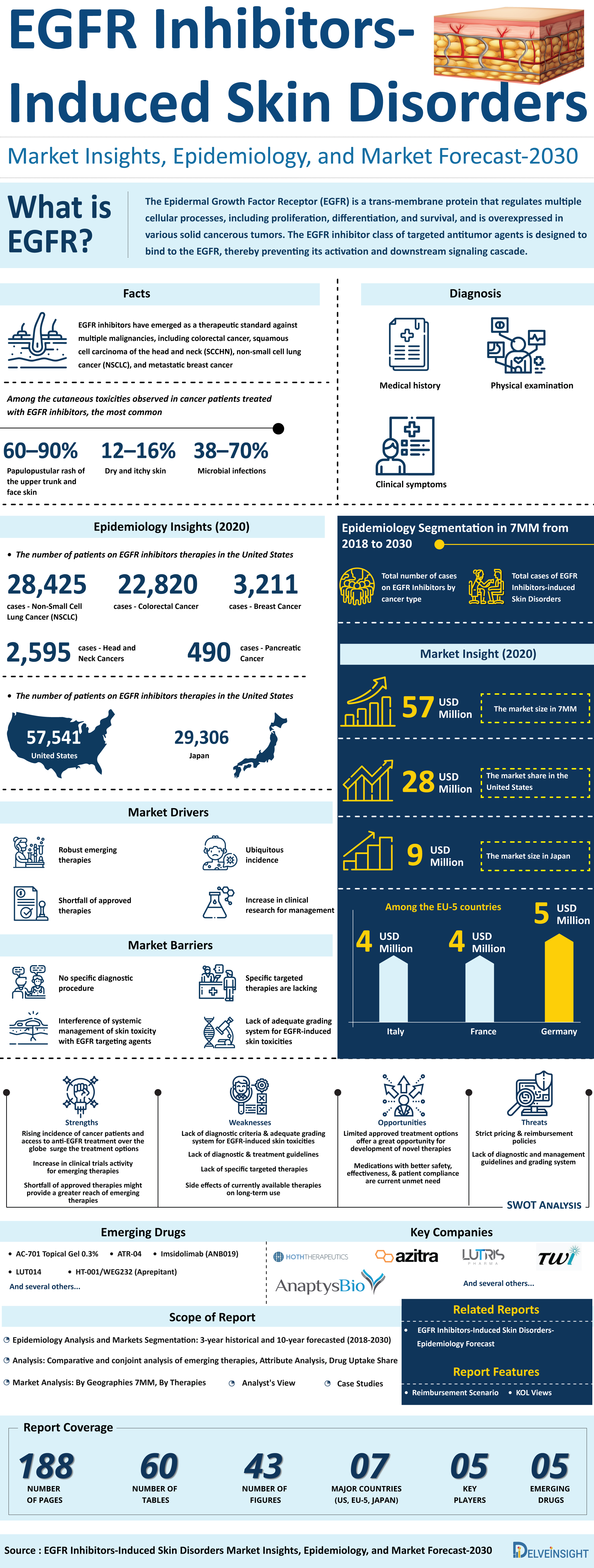DelveInsight’s EGFR Inhibitors-Induced Skin Disorders Market Insights, Epidemiology, and Market Forecast–2030’ report deliver an in-depth understanding of the EGFR Inhibitors-Induced Skin Disorders historical and forecasted epidemiology as well as the EGFR Inhibitors-Induced Skin Disorders market trends in the United States, EU5 (Germany, France, Italy, Spain, and the United Kingdom), and Japan.
EGFR Inhibitors-Induced Skin Disorders Overview
The epidermal growth factor receptor (EGFR) is a transmembrane protein that regulates multiple cellular processes. The EGFR inhibitor is a class of targeted antitumor agents designed to bind to the EGFR, thereby preventing its activity. The US FDA, the EMA, and the PMDA have approved several drugs in this class, and associated side effects have also been noticed.
Download Sample Report– https://www.delveinsight.com/sample-request/egfr-inhibitors-induced-skin-disorders-market
EGFR Inhibitors-Induced Skin Disorders Regions
- The United States
- EU5 (Germany, France, Italy, Spain, and the United Kingdom)
- Japan
EGFR Inhibitors-Induced Skin Disorders Side Effects
The most common side effects of EGFR-targeted therapies are dermatologic toxicities. EGFR inhibitor-mediated dermatologic side-effects include an acneiform skin rash, hyperpigmentation, xerotic skin, pruritus, skin fissures, nail changes, and disorders of mucous membranes, eyes, and hair. It is characterized by red papules and/or pustules on the face, chest, abdomen, or thighs; dry and scaly skin; fissures; hyperpigmentation; itchy skin eczema; erythema around several fingernails and toenails and other symptoms observed after anti-EGFR therapy.
EGFR Inhibitors-Induced Skin Disorders Diagnosis
The initial evaluation of a patient with EGFR inhibitors-induced skin disorders includes medical history, physical examination, and clinical symptoms, including the affected area. The lack of clinical practice guidelines for diagnosis, grading, and management is the key unmet need of the EGFR inhibitors-induced skin disorders market.
EGFR Inhibitors-Induced Skin Disorders Treatment
EGFR Inhibitors-Induced Skin Disorders is usually a self‐limiting disease with a clinical course that may last from months to years. Treatment is best individualized according to the type and the extent of the skin lesions. Topical antibiotic treatment with erythromycin, metronidazole, or nadifloxacin twice-daily has been recommended for early-stage, and low-grade papulopustular skin reactions cream or lotion preparations is preferred to take advantage of an additional moisturization effect. Topical hydrocortisone 1% cream or topical calcineurin inhibitors, such as pimecrolimus, have been reported to be effective. Oral tetracyclines, such as doxycycline or minocycline, reduce the severity and extent of the acneiform eruption. Paronychia is treated with daily antiseptic baths to avoid bacterial superinfection.
EGFR Inhibitors-Induced Skin Disorders Emerging Drugs
- Imsidolimab (ANB019): AnaptysBio Inc.
- AC-701 Topical Gel 0.3%: TWi Pharmaceuticals
EGFR Inhibitors-Induced Skin Disorders Market Companies
- AstraZeneca
- Pfizer
- Novartis Pharmaceuticals
- Janssen Research & Development
- Yuhan Corporation/ Janssen Research & Development
- Takeda
EGFR Inhibitors-Induced Skin Disorders Market Outlook
Inhibitors of the epidermal growth factor receptor (EGFR) are used in a growing range of tumor types to improve clinical outcomes. EGFR may be inhibited with anti-EGFR-specific monoclonal antibodies or small-molecule tyrosine kinase inhibitors. Dermatologic toxic effects are the most common side-effects associated with anti-EGFR therapy. The treatment of EGFR inhibitor-related skin reactions is not standardized, and accounts in the literature are based on local practice and mainly derived from personal, albeit extensive, experience. Currently, there is no approved therapy specific for anti-EGFR induced skin diseases in the US, EU, and Japan. The off-label therapeutic options used for anti-EGFR induced skin diseases are sunscreen, emollients and soap substitutes, antibiotics, antihistamines, topical steroids, and cosmetics.
For buying a report- https://www.delveinsight.com/sample-request/egfr-inhibitors-induced-skin-disorders-market
Table of Content
1. Key Insights
2. Report Introduction
3. EGFR Inhibitors-induced Skin Disorders Market Overview at a Glance
4. Executive Summary of EGFR Inhibitors-Induced Skin Disorders
5. Disease Background and Overview
6. Epidemiology and Patient Population
7. Patient Journey
8. Emerging Therapies
9. EGFR Inhibitors-induced Skin Disorders: Seven Major Market Analysis
10. Market Drivers
11. Market Barriers
12. SWOT Analysis
13. Unmet Needs
14. Appendix
15. DelveInsight Capabilities
16. Disclaimer
17. About DelveInsight
Request Sample Report– https://www.delveinsight.com/sample-request/egfr-inhibitors-induced-skin-disorders-market
EGFR Inhibitors-Induced Skin Disorders Market Report Highlights
- The robust pipeline with novel MOA and oral ROA, increasing incidence, effectiveness of drugs as both mono and combination therapy will positively drive the EGFR Inhibitors-Induced Skin Disorders market.
- The companies and academics are working to assess challenges and seek opportunities that could influence EGFR Inhibitors-Induced Skin Disorders R&D. The therapies under development are focused on novel approaches to treat/improve the disease condition.
- Major players are involved in developing therapies for EGFR Inhibitors-Induced Skin Disorders. The launch of emerging therapies will significantly impact the EGFR Inhibitors-Induced Skin Disorders market.
- Our in-depth analysis of the pipeline assets across different stages of development (phase III and phase II), different emerging trends and comparative analysis of pipeline products with detailed clinical profiles, key cross-competition, launch date along with product development activities will support the clients in the decision-making process regarding their therapeutic portfolio by identifying the overall scenario of the research and development activities.
About DelveInsight
DelveInsight is a Business Consulting and Market research company, providing expert business solutions for life science vertical and offering quintessential advisory services in the areas of R&D, Strategy Formulation, Operations, Competitive Intelligence, Competitive Landscaping, and Mergers & Acquisitions.
Contact Us
Yash
info@delveinsight.com
Media Contact
Company Name: DelveInsight Business Research LLP
Contact Person: Yash Bhardwaj
Email: Send Email
Phone: +919650213330
Address:304 S. Jones Blvd #2432
City: Las Vegas
State: NV
Country: United States
Website: https://www.delveinsight.com/

